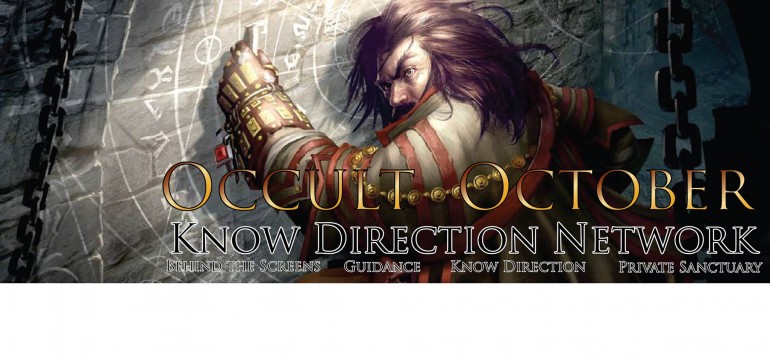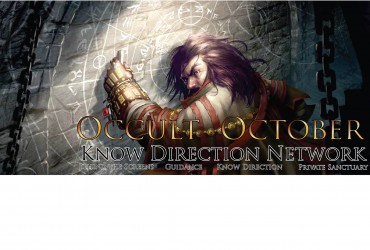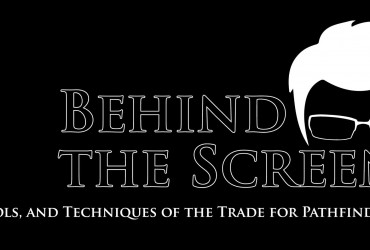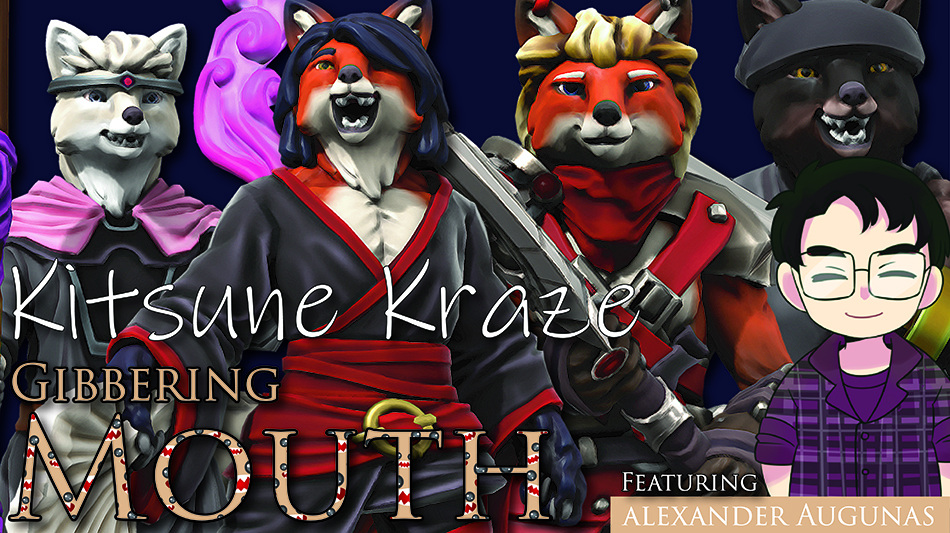Welcome to Guidance, Private Sanctuary’s source for tips and techniques for the Pathfinder Roleplaying Game, written by Everyman Gamer Alexander Augunas. Today, Alex is going to be sharing his Top 10-ish favorite Psychic Spells from Occult Adventures!
Hey everyone!
I mentioned in last week’s Iconic Design that I was going to a convention. (I actually ran Seige of Serpents! My very first time running a PFS Special!) So I apologize that I’m doing a Top 10 list today; I don’t really like doing Top 10 articles because they feel sort of lazy, but at the same time my Top 10 Favorite / Least Favorite spells series was REALLY popular the last time I did it, so I hope that you’ll forgive me by reading an opinion piece on something that a bunch of my readers seem to be interested in. I’ll make it up to you with an that you won’t help but dig, I swear!
Without any further adieu, time for me to show YOU my favorite spells from Occult Adventures!
10 – Akashic Form
This spell is neat. Available only to high-level psychics, akashic form allows you to place a psychic imprint of your body into the Akashic Record, a demiplane situated between the Astral Plane and the Plane of Time where all of history is recorded with perfect truth and accuracy. As one might suspect, this spell allows you to effectively “respawn” once each day after you die; its essentially the ultimate reset button. Psychic NPCs are especially terrifying with this special “cheat death” spell in their pocket, namely because it has NO MATERIAL COMPONENS WHATSOEVER. Free auto rez; nice. I didn’t nominate this spell higher because its not particularly imaginative, but that doesn’t mean that I don’t like it!
9 – Babble
This spell is TERRIFYING. Available as a 3rd level spells to most arcane and psychic spell casters, this spell allows you to make one target babble uncontrollably for a period of time, which makes her nauseated. Worse still, creatures AROUND the babbling target have to save each round or gain the fascinated condition as they become overwhelmed by the mindless gibbering. You can effectively force character to take only half a turn while allowing a bunch of other creatures to gain no turn. This works best against a bunch of rogues or fighters that’ll have trouble resisting the enchantment, but what you really want is to simply get babble off on its initial target. Just don’t let the babbling creature run too close to you!
8 – Explode Head
Of course I was going to nominate this spell. OF COURSE I WAS. This spell does exactly what it claims on the lid; explode heads. In many ways, its like a lower-level Power Word spell, and I’m okay with that. It’s a little limited, I suppose, and at higher levels you’re going to be harder-pressed to time this spell to trigger at the right time, but when it goes off, man, it goes OFF!
7 – Contagious Zeal
Warpriests LOVE this spell. Its basically a combination of heroism and aid, except it only affects one target initially. But each round, the target of contagious zeal can pick one creature and spread its zeal to that creature, providing it with the spell’s benefits. This is a fun, helpful spell that has a neat mechanic. (Especially in longer fights when used early.)
6 – Burst of Adrenaline / Burst of Insight
These two spells are effectively two sides of the same coin. As an immediate action, you can give yourself a +8 enhancement bonus to one ability score on one d20 check, but suffer a negative condition for one round afterwards. Adrenaline affects Strength, Dexterity, or Constitution and its negative condition is fatigued while Insight affects Intelligence, Wisdom, or Charisma and its negative condition is dazed. As a result, Burst of Adrenaline is MUCH less detrimental than Burst of Insight, but when it comes to succeeding on a save against hold person or being dazed for 1 round, I think I know what you’d pick. These spells are restricted to the psychic classes, but they’re pretty awesome all around, in my opinion.
5 – Mind Swap (Both)
This spell is something that NEEDED to be in the game for a convincing psychic class to exist. Mind swapping is an iconic part of psychic stories, and the mere existence of this spell allows hundreds of iconic tales to be told. Freaky Friday much? I really don’t have much to say about this spell because hands-down, it absolutely needed to be in the game.
4 – Possession (Both)
There is literally an entire sidebar in Occult Adventures that explains why this spell needed to exist, and Erik Mona is 100% right. Possession stories did NOT work in Pathfinder until the creation of a true possession spell.
3 – Telekinetic Maneuver
Ryan said it best on our All-Hands-On-Deck episode of Know Direction when he noted that the iconic fantasy of “guy/girl who moves stuff with the power of his/her mind” was REALLY hard to do before Occult Adventures came out. This spell helps substantially in making that fantasy a reality for spellcasters. (Although let’s be honest, the telekineticist does that fantasy WAY more good.)
2 – Synesthesia/Mind Thrust
I’m lumping these two spells together because I like them equally for the same reason; they both take your expectations for what effects belong in a given school of magic and toss them out the window the same way that conjuration started to do a long time ago. Synethesia uses illusions to disorient the target’s senses, making vibrant colors appear from their nose instead of smells, making touch generate sight, and so on. These illusions make it REALLY difficult to do just about anything, and place a number of nasty penalties like chances to take no actions, reductions to movement speed, and more. Mind Thrust, on the other hand, is a divination spell that allows you to scry on someone brain SO HARD that you actually start MELTING their mind, dealing damage to them. So yes, we have an illusion spell that does a lot of stuff normally associated with enchantment spells and a divination spell that deals damage like an evocation spell, and I LOVE it.
Neither of these spells are so powerful that they infringe upon enchantment or evocation’s domination in their respective areas, but these spells are effective enough that they add unique possibilities to spellcasters specializing in those types of spells. That’s pretty darn cool, if you ask me. (And you sort of did by clicking on this article.)
1 – Telekinetic Projectile
Believe it or not, but this 0-level spell is actually my favorite spell in Occult Adventures. Why? Because I very much like what this spell represents; a low-level cantrip that is actually effective at dealing damage. Actually. Effective. Yes, this spell will NEVER win you the damage dealing Olympics, but in all honesty, is this REALLY any worse than shooting a crossbow? Crossbows need to be reloaded, for one. Personally, I think that all spellcasting classes should have access to an array of 0-level spells that grant actual options in combat to casters. This was something that, in my opinion, 5th Edition did well and even if telekinetic projectile is limited to three classes, I am thrilled that it exists.
We need more, Paizo! We need more cantrips that give minor combat options to spellcasters. Because resorting to crossbows is lame.
Final Thoughts on Occult Adventure’s Spells
Occult Adventures didn’t have a whole lot of spells that I was super interested in, to be frank. While the undercast mechanic is cool, it uses up a LOT of this book’s space and I felt that a fair number of spells were either super high-level (likely to fill out the Psychic Class Spell List) or were “reimaginings” of 3.5 Psionic Powers. That isn’t a bad thing, as its nice to see Paizo acknowledge the game’s heritage while simultaneously drawing on the same occult sources that those original books did, but at the same time I didn’t leave feeling overly impressed. There were a number of spells that I was disappointed to see restricted to the psychic spellcasters, such as the “burst of” spells, and mostly it boils down to the simple fact that psychic spellcasting is surprisingly broad in Pathfinder. It isn’t all brain-affecting magic; its a very robust system, but at the same time that’s mostly because it borrows a lot of spells from the existing arcane and divine spell lists. I’m not sure if psychic spellcasting is ever going to really “wow” me, and honestly, maybe its not supposed to. One of the things that the developers didn’t like about psionics was how different it felt. Psychic magic doesn’t feel different. Maybe that’s what they’re going for? I guess only time will tell, eh?
Thanks for joining me in today’s installment of Guidance. If you have any questions or comments, leave’em below. What are your favorite spells in Occult Adventures? Should I do more Top 10 lists? What kind of lists would you want to see? I’m waiting for YOU, dear readers! Good day, and take care!
Alexander “Alex” Augunas has been playing roleplaying games since 2007, which isn’t nearly as long as 90% of his colleagues. Alexander is an active freelancer for the Pathfinder Roleplaying Game and is best known as the author of the Pact Magic Unbound series by Radiance House. Alex is the owner of Everyman Gaming, LLC and is often stylized as the Everyman Gamer in honor of Guidance’s original home. Alex also cohosts the Private Sanctuary Podcast, along with fellow blogger Anthony Li, and you can follow their exploits on Facebook in the 3.5 Private Sanctuary Group, or on Alex’s Twitter, @AlJAug.






